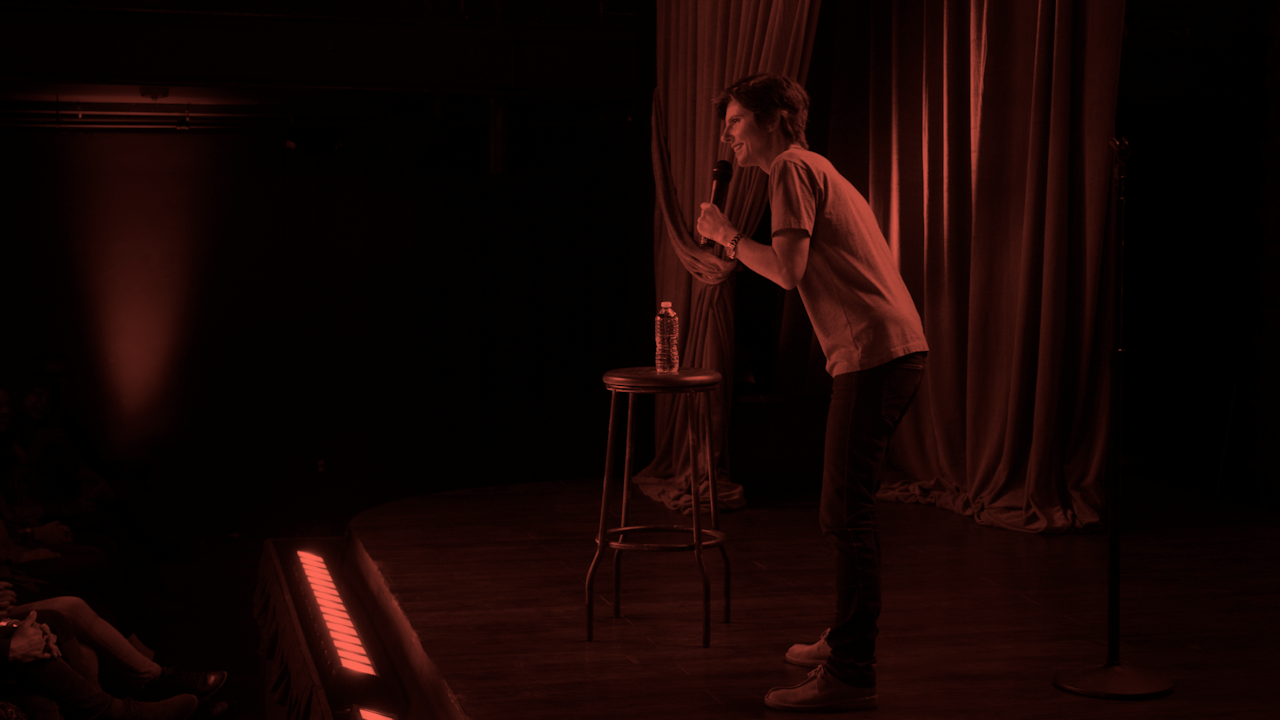Tig Notaro has made an art out of laying herself bare and then attempting to obscure herself from the awe it inevitably inspires. From her stand up, which veers wildly between the deeply personal and the casual anecdote, to her now-cancelled semi-autobiographical show, it’s easy for audiences to think they know the comedian through and through. In her 2015 HBO special Boyish Girl Interrupted special she famously performed topless, solidifying her place as one of comedy’s most innovative and vulnerable figures today. But in her new Netflix special Happy to Be Here, the seasoned comedian plays with her public face, poking fun at the idea that we think we know her — or her comedy — at all.
More than just a quality of her act, Notaro’s public image is an exercise in self-effacement. Her Instagram account is rarely updated. Though she has over 87,000 Twitter followers, she never speaks through the platform. Instead, her friends and “friends of friends” (mostly comedians) tweet through @TigNotaro and have ever since the account began in 2015. Her 2016 memoir is called I’m Just a Person, and even the title Happy to Be Here downplays Notaro’s reputation and drawing power.
It’s hard to believe that her last standup special was nearly three years ago, but considering the context in which it was made, the distance feels so much longer. Back then, Notaro was still considered a rising star. She still expressed enthusiasm at working with Louis C.K., whom she later distanced herself from before a 2017 New York Times report detailing his rumored sexual abuses of women. Beyond him, fellow comedians such as Aziz Ansari and once-rising comedy star T.J. Miller have been accused of varying degrees of sexual harassment, and in Miller’s case, assault. The biggest reckoning with comedy world “greatness” came on April 26, when Bill Cosby was found guilty of sexually assaulting Andrea Constand, one of 60 women who have accused Cosby of the same over the past three decades.
None of this comes up in Happy to Be Here, nor did it need to. But through her anecdotal skewerings of her own celebrity and breakdown of the nature of her work itself, Notaro sidesteps the idolatry promised at her level. Performing in the bright and cozy Houston The Heights Theater to an audience markedly smaller than that in Boyish Girl Interrupted, Happy to Be Here is a departure from the altar-like stages that are commonplace for hour-long affairs.
She skewers ambiguity about her identity, starting with jokes about her lifelong experience of being mistaken for a man. She pokes fun at her signature delivery and overall presentation (“‘I’m a comedian.’ I might as well have said, ‘I’m training to be a motivational speaker,’” she says miming a withering lifeless version of herself). She talks about being married to her wife, actor and writer Stephanie Allynne, and raising two twin boys. She talks about going to Ellen DeGeneres’ and Portia de Rossi’s joint birthday party (“That’s a party bit,” she recalls thinking before throwing herself into a celebrity packed social interaction). But above all she focuses on the discomfort and resulting hilarity of missed and miscommunication, jokes that particularly shine when dissecting the intersection of Tig Notaro the person and Tig Notaro the famous comedian.
“I’ve been doing stand up for 20 years and in order to make you happy I have to make myself happy first.”
The final 15 minutes of the special, nearly an eternity in stand up time, is an extended game of comedic torture as Notaro teases the idea that her favorite band, The Indigo Girls, would be coming out to perform. Surely, she didn’t get such a famous band to fill the unconventional role of stand up special closing band — but then again, maybe she did. It’s that focus on craft and the artifice of both celebrity and comedic conventions that gives this special a similar feeling of upheaval and newness that surrounded Boyish Girl Interrupted and Tig Notaro: Live, which includes the routine that first made critics recategorize her into the male-dominated realm of comedy Greats.
At the heart of her performance is the idea that more than being self-mythologizing or aiming for canonical status, comedy must always return to fun. For Notaro, that fun comes in watching her audience squirm as she candidly dances around their expectations. “I know you came for punchlines,” she says early in Happy to Be Here. “I’ve been doing stand up for 20 years and in order to make you happy I have to make myself happy first. And it truly tickles me to tell you a long, boring story that ends with, ‘So that was a hard time.’” Notaro relishes making audiences uncomfortable, but in a way that is invitational rather than confrontational, as much comedy labelled ‘daring’ is. Notaro may never be the kind of public figure that our celebrity culture demands, but no matter how humbly she attempts to present herself, her immense talent and essential understanding of comedy can’t be denied.
